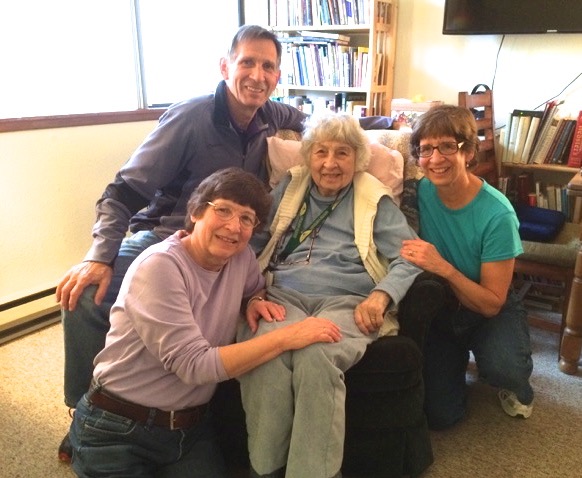Stories from Caregivers: Shirley from MAINE
ME
Shirley
FROM MAINE
Shirley I'm sitting here trying to locate the moment when eldercare of Mom (Harriet) began for my siblings and me. I think it was the phone call. I think Mom was about 80. She lived in Iowa and I was visiting from Maine and she was on the phone telling the caller very strictly and rather rudely never to call her again. This was unlike our mother. Totally unlike her. Turned out she felt harassed about her credit card - those people kept calling, kept expecting her to pay, but she knew her friends would be paying any day now and anyway she wasn't the one who spent the money. Slowly the story emerged. Mom, in her 70s, had been secretly, gradually, turning her life savings and then her credit cards over to her young "friends," Jennifer and Jeff. Why? Because she loved and trusted them. Because they told her they were going to create World Peace. Because life on earth would be spiritually transformed, but of course they needed money to make it happen. And, by the way, in the end she would become wealthy. Very long story, shortened: in stages, over years, we took more and more control of Mom's money. We got her out of debt and saved her condominium for her, due to the generosity of my partner who received a timely inheritance, and in the final stage we took total control of her checkbook. And no more credit cards, of course. We never had to follow through on our shaming threat to get a conservancy because Mom slowly, over years, with many lapses when she managed to give more money to her "friends," yielded to our informal measures. How much did dementia contribute to Mom's becoming the victim of a massive scam (some of the perpetrators, but not all, are currently in prison)? It's impossible to say. But slowly, slowly, it became clear: the dementia was there, Mom could no longer live on her own. She begged to differ. One of the most difficult aspects of taking care of Mom, who died at the age of 97, was having to use manipulation and threats to get her into situations where we could protect her. There were stages. She came to live with my partner and me for several months, then went to Oregon to live with my sister and her husband for several more, trying out Maine, trying out Oregon. Then we "allowed" her to go back home for the summer while she decided whether to go to a facility in Oregon, where my sister and one brother would be nearby, or come to Maine near my partner and me. She chose Oregon and, under duress, allowed us to pack her things, empty her trailer, settle her at Churchill Estates in Eugene, a process involving intense, amazing teamwork among Mom's 5 kids and all partners. 4 years in the facility. Mom: never resigned, but being in many ways heroic about her unwanted circumstance. A long downhill slide, physically and mentally. But she always recognized her kids, and she never needed a wheelchair. Intensive ongoing teamwork among siblings. My sister, Karen, spent 2 days a week all day with Mom, tended to meds, laundry, all errands, all fiscal matters, working with staff at Churchill Estates, trying to help Mom be as happy as possible. My brother, Larry, visited frequently and gave Mom much-appreciated chiropractic treatments. Throughout final year he, who was closest geographically, went nightly to put her to bed. I was across the country, an agonizing distance. I visited a couple of times a year and phoned Mom every day my sister wasn't with her. My task was to help her get going in the morning, direct her to take her meds and do the basic self-care she could still manage if directed, and try to get her to laugh once in a while. As the dementia increased, this long-distance managing worked less and less well, of course. My sister and I talked or emailed at least once a day, often many times a day, throughout the 4 years. My sister and brother stayed in close contact. The sibling team worked: we were very lucky. Mom was a small frail creature who had streaks of toughness no one would have suspected. While at the facility, she fell 22 times, but never had to be hospitalized. Toward the end she lost weight, pretty much stopped eating. After the final fall she just went to bed, was in and out of a diminished awareness. Hospice entered. Family gathered around, by phone if unable to be there in person. My heroic sister and brother never left Mom's room during the days it took for her to gradually manage the work of dying, that astonishing final work we must all undertake. Mom died peacefully while my brother slept next to her bed on the floor. It's not easy. It's worth it. (Photo: Shirley, Larry, Harriet, and Karen)
